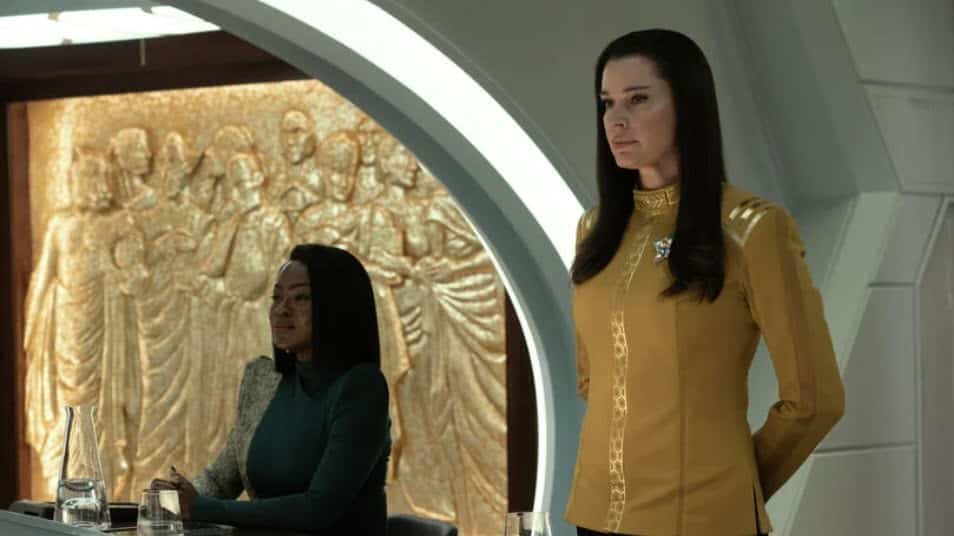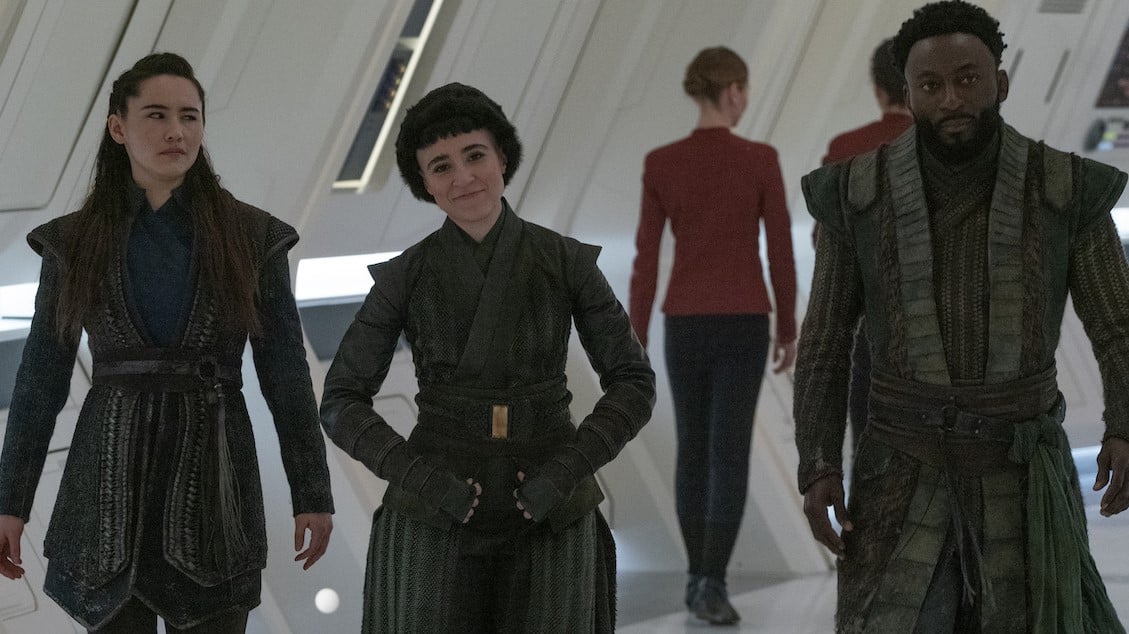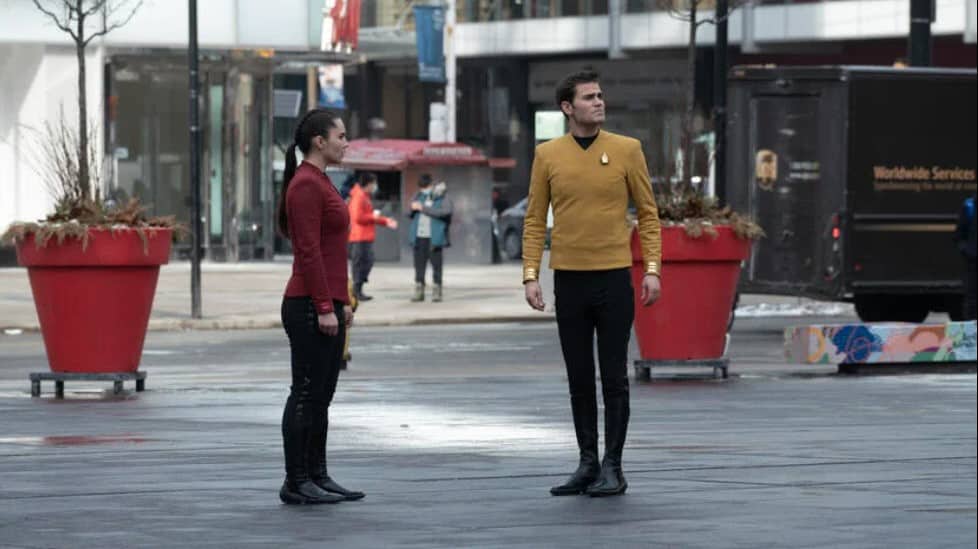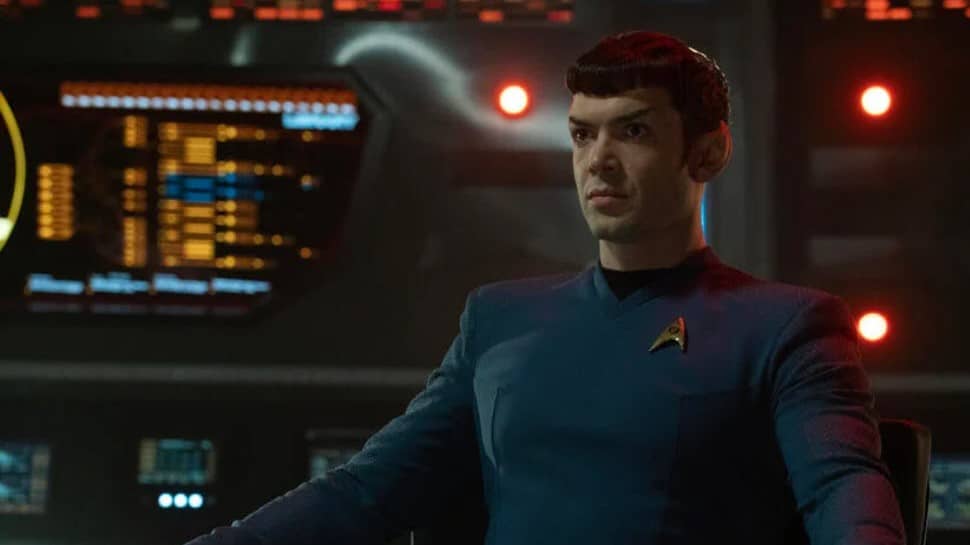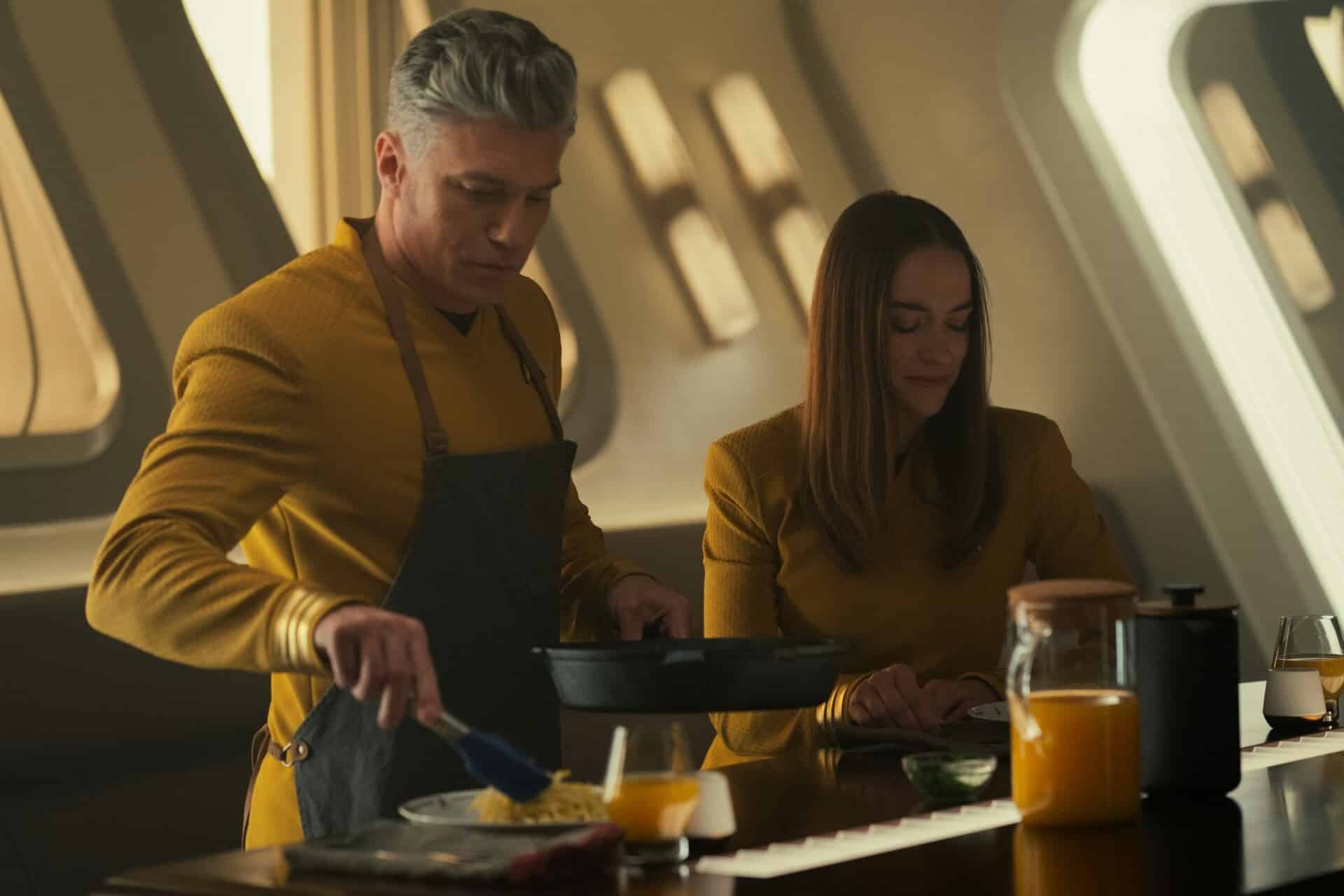Number One stands trial for concealing her augmentation from Starfleet while Captain Pike and the crew do all they can to help in “Ad Astra per Aspera“, Strange New Worlds SE2 EP2 written by Dana Horgan and directed by Valerie Weiss.
Mark Turetsky: Hi Will! You’re a lawyer, right? What if I set up a TV on an AV stand (you know, the kind they had at school when we were kids, with the VCR and the CRT TV?) and have you react to a Star Trek?
Will Nevin: Hi, Mark! I’m lawyer-ish (J.D.’d but not practicing), but your idea sounds fine. I mean, I like a lot of Star Trek, and there have been a couple of courtroom drama-esque episodes like “The Drumhead” and “Measure of a Man” that were fantastic. I’m sure any subsequent episode would have to be just as good, right?
Mark: So your lawyerness is a lot like my Judaism. You’re non-practicing. I’ll also make sure we put up a big disclaimer that none of this review of an episode of Star Trek should be considered legal advice, okay?
Will: Good. Because I’m not your attorney. Or anyone else’s.
Opening Argument: The Core of This Episode is Good
Mark: So, Captain Pike is back this week, though maybe not in as big a way as we might have expected, given those other Trek legal dramas. This time, he’s not going to be arguing his crewmember’s case, he’s off to get her a lawyer. In this early scene where we see him, exhausted, running out of oxygen, on the verge of collapse, I should point out that he was largely absent from last week’s episode because Anson Mount is a new parent. I have to wonder how much of his appearance here (and Captain Batel’s noting that he looks awful) was written around that.
Will: So Captain Daddy is *actually* a daddy. Good for him! We’ll talk more about how this episode speaks to (or doesn’t speak to) the last one, but, yeah, Pike’s job at the beginning is to convince one of the galaxy’s preeminent civil rights attorneys to take Una’s case. That mission accomplished — in his charmingly roguish way — he’s left to watch the proceedings with the rest of the crew. At least we were given a plot reason for cutting him out of the case? It still comes off as a bit odd, which, again, we’ll get into.
Mark: It helps that the galaxy’s preëminent civil rights lawyer is also an Illyrian and Una’s childhood friend, Neera Ketoul, played with aplomb by Yetide Badaki.
Will: *Estranged* childhood friend. The galaxy is very small, Mark.
Mark: Neera, throughout the episode, seems to toe the line between wanting to win the case and scoring points against the Federation in general and Starfleet in particular. There’s an appealing ambiguity about her precise motivations, as she doesn’t seem to particularly like Una. On the prosecution side of things, we have Pike’s erstwhile fuck buddy Captain Batel and her boss, the Vulcan admiral Pasalk. Whereas Batel makes it clear throughout the episode that she doesn’t want to be there (presumably so she can stick around as a recurring character and not just be written off as a villain), Pasalk seems to take a perverse pleasure in his job. [Ed. Note: “Emotionless” my ass.]
Will: You’ve laid out our characters quite well, skipper. And here’s the thing: As an emotional story, as an allegory for any sort of discrimination under color of law you wanna think of, this story works. As a piece of media dropping during Pride, I can’t find fault with the core of this episode. Una is as her culture made her — and while this episode pushes the allegory all the way up to the breaking point (and maybe gets a little heavy handed when we get into the segregation/apartheid moments of Una’s backstory) — and we absolutely feel for her the entire time.
Mark: Absolutely, from the opening scene, where her parents are afraid to bring her to a hospital for fear of being discovered, to Ketoul’s opening argument listing off the various injustices historically meted out under unjust laws, there are so many parallels to be drawn. It could be undocumented people, it could be parents of trans children facing doctors who will refuse to treat them. Even the badge on Una’s dress uniform that she wears throughout the trial is not dissimilar in shape from the Magen David that the Nazis required all Jews to wear.
Possibly my favorite part of this episode comes from Ketoul’s two scenes with La’an. La’an is clearly concerned about her friend and mentor. She believes that someone might have been reading her personal logs and that she might be responsible for Una’s arrest. But that’s not the entirety of why she’s there. She goes to Ketoul to commiserate, and Ketoul senses that. La’an carries a great deal of guilt and worry about her family’s genetic modification and she’s seeking out a sympathetic ear. It’s a great scene when Ketoul susses that out and reassures her that there’s nothing wrong with her, nothing wrong with them, and switches her language to start referring to an inclusive “we,” a “we” that includes La’an as well as the Illyrian people.
Will: In rolling up the Eugenics Wars into the Third World War, we’ve refocused the former into something much more critical to the history of Earth, and it makes sense that both the Federation would have this draconian stance and La’an would still carry guilt and stigma generations later. Also, I wonder if that wartime/our near future period is going to be explored in this season’s time travel episode — but we’ll get to that when we get to it.
La’an also has that great scene with Uhura in which the latter flatly states that she will refuse to obey an illegal order even if it might help Una. Quite a bit to think about in this episode about just and unjust laws and what people of good conscience might do in impossible situations.
Mark: It says a lot that La’an is willing to break the law and risk court-martial herself in order to save her friend. But then again, it might be that subconscious self-hate that Ketoul tells her about, that looking down on themselves that the Federation’s prejudice instills in them. That she thinks she deserves to go down in Una’s place.
Will: It also gets at the idea that ideal officers — ones who seek to do the most, best good — are *always* breaking regs. You put Bob April on the stand, and any opposing counsel is going to point out the times he broke General Order No. 1. And why did he do that? Well, like any great captain stuck between two bad options, he picked the one he thought that was best, the one that would preserve life. We saw the same thing in “The Drumhead” when Jean-Luc Picard had to defend some of his own tough choices on the stand.
Also, please give me all of the lore on the development of the Prime Directive and how it became so important to the Federation. Can’t get enough of it.
Mark: The Robert April sequence is really interesting to me. First, I’m glad someone finally pointed out onscreen how often starship captains break the Prime Directive. When April shows up in Pike’s quarters, I can’t quite work out how we’re supposed to feel about him. Are we to take it that he’s a good man, a good starship captain who also happens to be bigoted against Una? When he complains to Pike that he didn’t even get to talk about how great Una was, when he tells Pike it’s a “shame the rest of the court didn’t get to hear that today,” he comes across as one of those allies who argue that because someone in a persecuted group was once mean to them, that they’re not going to fight as hard for them anymore. How did it come across to you?
Will: To me, I read it as subtext that should have been made more textual — in that April is part of Starfleet brass now, and the brass for some unclear reason wants to put the screws to Una. We get a little bit of that when we’re told Una is to be made an example, but we needed more why and exactly what part April played in that. Again, though, that’s just my reading of it. It’s the best answer I have to explain the admiral’s part in the episode and his testimony.
Mark: Yeah, there’s an element of conspiracy going on in the episode that I’m wondering if they’ll revisit. As you point out, Batel doesn’t know why the JAG is so interested in making an example of Una. I initially thought that La’an’s “fruit of the poisonous tree” investigation might reveal it, but there definitely seems to be something else going on here. It would also explain Admiral Pasalk’s desire to bring down Pike and any other crewmembers who knew. As it is, we’re kind of left to wonder.
There’s also the instance where, even though the Enterprise crew are generally painted in a good light, Ortegas makes some pretty bigoted remarks to M’Benga, human to human, about Spock and his meeting with Pasalk. She refers to them as “Vulcan bros” who are conspiring to put Una away. It’s reminiscent of her alternate future reaction to finding out that Romulans look like Vulcans from “A Quality of Mercy.” M’Benga patiently explains to her that, no, not all Vulcans are alike, and that Spock fucking hates this guy. M’Benga’s modeling some good behavior here when one of his friends says something, well, racist.
Will: I would be exceptionally uncomfortable using BIPOC actors to make bigoted statements as an example of some kind of irony, which Nicholas Meyer actually attempted to do in Undiscovered Country. You’re right that M’Benga pushes back, and Spock confirms he doesn’t care for Pasalk, but I would have liked a taste of that conversation or some other kind of character development for the admiral. But as you pointed out, that might be coming down the road if the Enterprise and/or Pike is Pasalk’s white whale.
Mark: Having a member of a historically discriminated against group spouting fantasy racism is an unfortunately common trope, it’s true. And the other thing that bugged me is that they had a Vulcan in the villain role. Part of me thinks they had an alien be that bad guy to play on some inherent xenophobia.
Will: You’re not wrong, but I will say one of the more interesting things about Enterprise and this era generally is a chance to explore a Federation in which not all humans and Vulcans get along. But that’s canon history and not the writing of this particular episode.
Mark: I’m begging you to watch Deep Space Nine’s “Take Me Out To The Holosuite.”
Objections? We’ll Allow It
Will: If we’re moving on to our gripes, I’ve gotta say — as a lawyer-adjacent person — some of the courtroom procedure stuff was laughably stupid. Like, “bad even for an episode of SVU” level dumb. ‘The Drumhead” and “Measure of a Man” worked in part because they focused on big themes and the core emotional message of the story. When this episode focused on that, it worked. When it turned its attention to Federation law and “technicalities,” it failed. Miserably.
Mark: Do you mean it’s not common for the defense to make the entirety of their legal case in their closing arguments? Or that those closing arguments don’t often involve cross-examining members of the opposing counsel?
Will: Not even in Perry Mason (RIP), Mark! The courtroom stuff that wasn’t trite was, and I hate to keep using this word in reference to a series that I fucking adore, stupid as shit. Una was being court martialed. You can’t somehow convert that to a civilian asylum hearing. And while being overcharged with sedition is proof of a conspiracy against Una, there was zero — none, zip, ZERO — evidence of “attempts made by meetings or speeches, or by publications, to disturb the tranquility of the state,” to borrow the Black’s Law Dictionary definition of “sedition.” They wanted to use a scary sounding legal word without any care as to what it actually means. Dumb, dumb, DUMB writing.
Mark: What about the Alien and Sedition Acts? She’s an alien, Will.
Will: If you were any other man, I would kill you where you stand for that joke, Mark. But despite it being a groaner, it only underlines my point: Those laws, passed specifically to silence political opposition in defiance of the First Amendment, targeted speech against the government. At what point does Una protest the Federation? Publicly complain about the restrictions against genetic modification? Again, it’s bad and dumb, but it strengthens the sub-textual idea that the Federation considers this ban a core component and essential to the government’s survival to maintain.
Mark: Let’s say, for the sake of argument, that Ketoul went through the proper channels and got Una’s asylum status granted, would that provide her immunity against the charges brought against her, in this theoretical legal system?
Will: I’d still say they’re two separate things. Let’s go back to a “Don’t Ask/Don’t Tell” or even earlier era of military policy in re: homosexuality. Someone could flee persecution in their home country (seeking asylum) and join the military as some sort of permanent resident. But they could have then still seen military charges for being homosexual. It’s a sloppy conflation of distinctly different proceedings.
Mark: Still, wouldn’t it have… I don’t know if “chilling effect” is the right term, but wouldn’t it make it less appealing to request asylum if the governing body to whom you requested asylum used your asylum application as evidence to arrest you? Wouldn’t that be, like, say, promising a path to citizenship or some measure of legal status for undocumented immigrants if they just filled out some forms, and then using those forms as evidence against them?
Will: What savages would prosecute asylum seekers?
I see what the episode was *trying* to do, but it just doesn’t work on any level aside from an emotional one. Lawyering is not about pointing to that one hidden statute that you’ve found a creative use for. And “technicalities” are important due process protections, like, you know, not allowing the government to arbitrarily charge you for whatever crimes it *feels* like you committed. Our justice system — however flawed it might be — is based in fact and law, and the Federation’s should be as well.
Mark: Still, I’m betting those judge admirals didn’t then go to the Federation News Network and publish an essay about how cool it is that they get great gifts from Ferengi moguls, and how nobody is respectful enough of how cool it is that they get them. Ah, to live in the Federation…
Will: Samuel Alito fuckin’ sucks.
Any Other Business Before This Court
Will: Aside from the Star Trek: Law and Order stuff, we got any more gripes about this episode?
Mark: I’m utterly unsure about this Vaultera nebula business. Pike visits the Illyrian colony in the Vaultera nebula and is shown as the only one needing a breathing apparatus, and his narration informs us that everyone there has been genetically modified to deal with the toxic atmosphere (ie, they’re Illyrians). But then in the trial scene, Una says that she grew up in a Federation colony in the Vaultera nebula, and it’s made exceedingly clear that non-Illyrian Federation citizens live there. So is this a different colony in the same nebula? I can’t quite figure it out.
Will: Aight, I’m going to tread dangerously and science a way out of this. Let’s assume the majority of lifeforms in the Star Trek universe breathe air similar to ours, which the government classifies as “oxygen deficient” when it drops below 19.5% oxygen. Other, heartier species maybe be able to survive in areas where humans can’t. So I can see Illyrians tinkering with their DNA but Vulcans and others living comfortably in that same space. That colony would clearly exclude humans, though. I dunno, Mark, that’s all I got here.
Mark: Maybe, and I don’t think she ever mentions humans in her testimony, but it’s pretty unclear. How about you, Will, anything else sticking in your craw?
Will: I understand the premise of Strange New Worlds as a promise of self-contained episodes, but I really could have used a bit more serialization this week. Like something from Pike: “So, Mr. Spock, I heard you stole the Enterprise while I was away. Maybe we try not to do that again.” It’s so bizarre that we had *zero* follow-up from what happened last time out. [Ed. Note: Especially given that this episode was all about a crew member being accused of a crime and the quasi-legal actions of her crewmates being called into question.] And, you know, it feels strange in this era of Nu Trek that our season 1 cliffhangers involving La’an and Una are now succinctly concluded.
Mark: I’d posit that maybe this episode was written to be the season opener, and that last week’s was added in due to Mount’s paternity leave, but then there would be no explanation for La’an being back, and she’s pretty crucial to this episode.
There’s also the optimistic ending of this episode, where, while they didn’t overturn the law, “it’s a start.” Obviously, the genetic enhancement stuff needs to remain in place for when it comes up in TNG and especially becomes important on DS9. Still, it’s somewhat bleak that they’re still dealing with the same prejudices over 100 years later in “Doctor Bashir, I Presume.” I’ll grant, though, that Doctor Bashir has a much easier time than Number One does here.
Will: If you want to talk about the ending, I thought everyone clapping for Ketoul was cringeworthy. But your point certainly stands.
Mark: That, and when Una talks about seeing a Starfleet crew and marveling how “they were all so… different from one another” and then panning over the members of the Enterprise crew watching the trial, who, while diverse, only have one non-human among them. It kind of undercut Rebecca Romijn’s performance, which I thought was excellent throughout the episode.
Will: Where’s Hemmer when you need him?
Mark: Oh, and one more thing, before I go [/Columbo]. During Spock’s testimony, he makes reference to his first meeting with Number One, which happens in the Short Treks episode “Q&A.” The short, written by Michael Chabon, has Number One advising Spock to hide the things that make him different from other Vulcans, because “one must be aware […] of how one is perceived by one’s comrades.” An interesting bit of foreshadowing here, which makes me wonder how much of Una’s secret identity was planned by Chabon, who isn’t involved in Strange New Worlds, as far as I can tell.
As always, Will, it’s been fascinating and enlightening.
Will: Be sure to put away the TV on your way out, Mark.
Stray New Words
- The text of General Order One comes from the Star Trek: The Animated Series episode “The Magicks of Megas-Tu” (the one with The Devil!).
- The court martial seemed to take place on Alcatraz.
- No Pelia this week, and still no promised James T. Kirk.
- What’s the standard oxygen concentration on a Federation starship?
- It’s a nice touch that Ketoul calls Pike “Mr. Pike” in her office, but always calls Una “Commander Chin-Reilly” in court.
- Not only is Star Trek: Prodigy canceled, it’s being pulled from Paramount+. Streaming sucks. [WN]
- WHAT?! FUCK! [MT]

